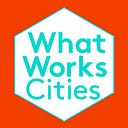Portland’s GATR Sinks Teeth into Performance Improvement
Sustaining a performance management program across mayors
As one of the fastest-growing cities in the country, Portland, Oregon, has undergone significant change in the last decade. The City gains an average of 32 residents each day, and over 20,000 new housing units have been constructed since the start of 2014. We’ve also seen our fair share
of political change amid this growth. Fortunately, the What Works Cities (WWC) initiative has helped the City navigate these changes.
Portland has been one of the only What Works cities to undergo a mayoral transition during several active scopes of work. One of the key goals for our performance management engagement with WWC partner the Center for Government Excellence (GovEx) at Johns Hopkins University was to strengthen our relatively new PerformanceStat program, known as Government Accountability, Transparency and Results, or GATR. GATR sessions were already credited with initiating dramatic improvements in affordable housing development and police patrol staffing levels. In addition, GATR had the best mascot of any stat program (as evidenced above). That said, the City’s performance management team was well aware of the challenges of transitioning this management tool from one administration to another; sometimes, performance management programs can be viewed as so aligned with a previous administration that incoming mayors are compelled to create some distance.
Well, spoiler alert: with GovEx’s support during the Mayoral transition, the City of Portland launched a GATR series addressing the city’s housing shortage within the first month of Mayor Ted Wheeler’s administration. The session identified several common-sense process improvements aimed at improving outcomes — both for development customers frustrated at long processing times and for the City employees tasked with reviewing the mountain of new development applications. As a result, the City now offers online payment options for common public works permits, and has established a new monthly roundtable for the six bureaus involved in permitting to collaboratively work toward City goals.
Mayor Wheeler’s second GATR series focuses on bringing 911 emergency operations up to national standards in response to the discovery that call hold times were significantly longer than previously reported (see below). Immediate action items included modifying the dispatch operations schedule to better match call volumes, and finding a software solution that supports more complex and flexible assignments. In sum, the GATR approach is accelerating the improvement of City services under Mayor Wheeler’s leadership.
So, how did we navigate the transition? Looking back, it seems that establishing structured roles for all participants was a big factor in GATR’s continued success. Portland’s City Budget Office, which houses the City’s performance management function, has always had a strong co-ownership of the GATR program with the Mayor. The Mayor determines the topics and directs each session, but session materials are produced by the City Budget Office in partnership with other City bureaus.
Additionally, while the Mayor and Commissioner-in-Charge set the goals for each topic, bureaus are expected to provide their recommended strategies to reach those objectives. As a result, other City Commissioners viewed the sessions as a useful management tool, and participating departments recognized the new platform as a way to advance favored innovations. Their buy-in encouraged support from the new administration, and participation has since expanded to include other City bureaus that provide support for change management. Achieving better performance is steadily becoming a part of everyone’s job.
For Portland, the stat approach is a leadership strategy to achieve better results for the community. But the GATR sessions also serve a second purpose: to demonstrate that, through cross-boundary collaboration and greater use of data and evidence, solving the city’s biggest challenges is within our reach. Mayor Wheeler is bringing more of these practices into his administration’s strategy by participating in the first cohort of the Bloomberg Harvard City Leadership initiative. In 2018, Portland will be looking for opportunities to bring a results orientation to other task force meetings on major city issues. Stay tuned to find out where the GATR turns up next!
Shannon Carney is the Performance Management Analyst for the City of Portland, Oregon. When not acting as a good government advocrat, she enjoys the bounty of the region through cycling, attending literary arts events, and dining out.
Learn more about GATR and other City of Portland performance management initiatives by following @tedwheeler and @PDXBudgetOffice on Twitter.
